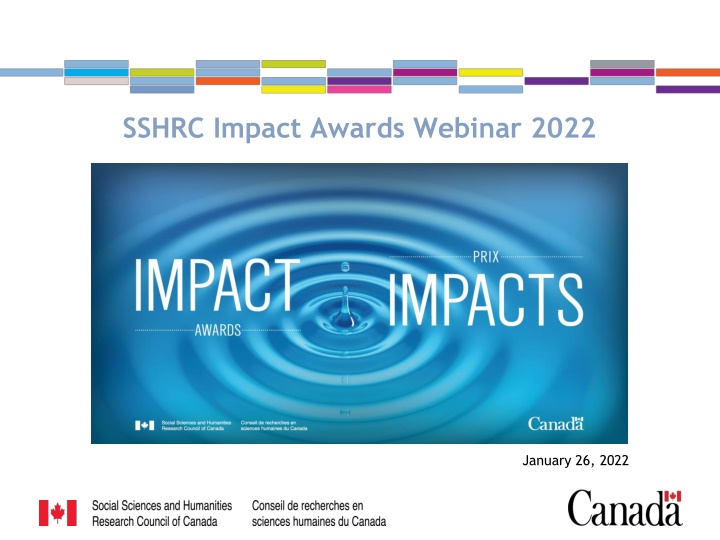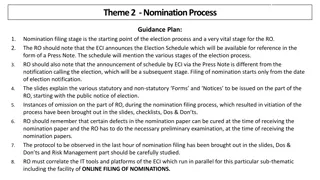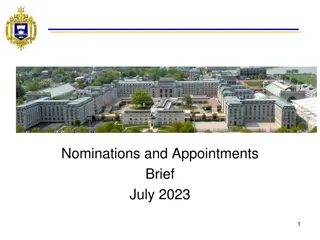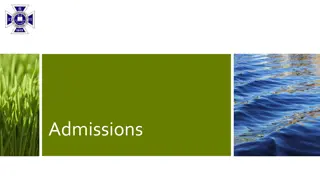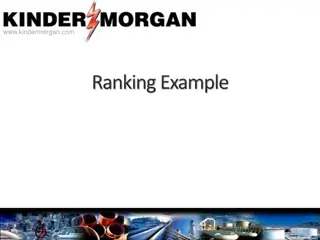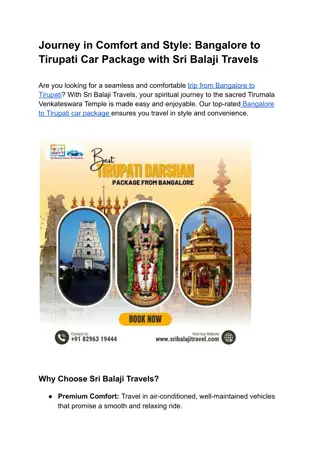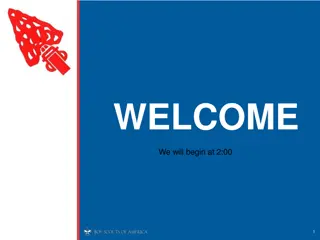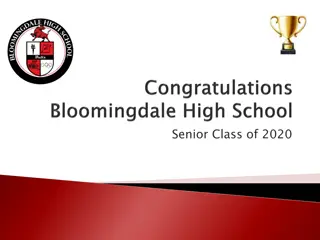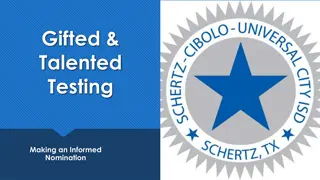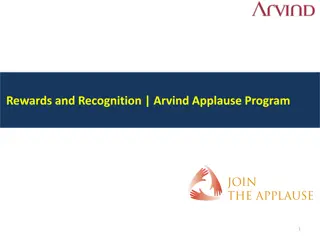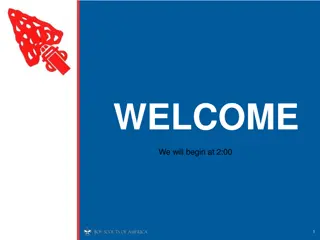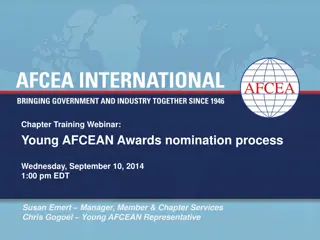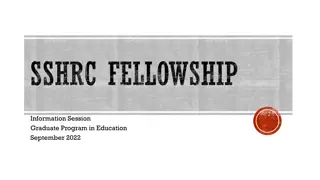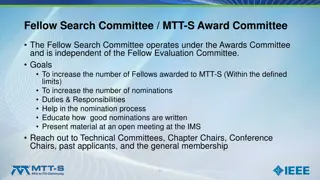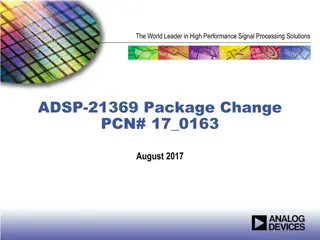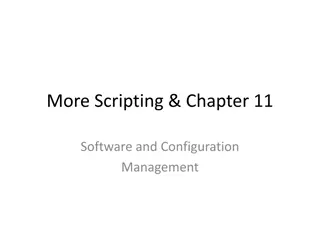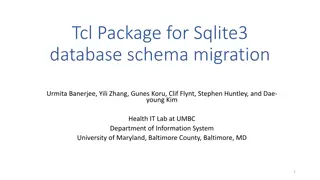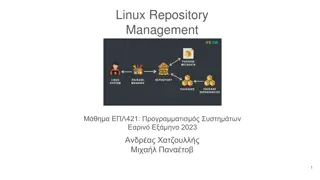SSHRC Impact Awards Webinar 2022 - Nomination Package Overview
Detailed overview of the SSHRC Impact Awards nomination package components, including the institutional nomination process, required documents, reminders, updates, FAQ, and considerations for career interruptions and special circumstances. Learn about the nomination process and key information for submitting a successful nomination.
Download Presentation

Please find below an Image/Link to download the presentation.
The content on the website is provided AS IS for your information and personal use only. It may not be sold, licensed, or shared on other websites without obtaining consent from the author.If you encounter any issues during the download, it is possible that the publisher has removed the file from their server.
You are allowed to download the files provided on this website for personal or commercial use, subject to the condition that they are used lawfully. All files are the property of their respective owners.
The content on the website is provided AS IS for your information and personal use only. It may not be sold, licensed, or shared on other websites without obtaining consent from the author.
E N D
Presentation Transcript
SSHRC Impact Awards Webinar 2022 January 26, 2022
Overview Components of the Nomination Package Reminders and Updates Frequently Asked Questions Questions and Answers Important Dates Additional Information and Resources 2
Elements of the Nomination Package 1. 2. Institutional nomination process (one page maximum) Institutional nomination letter and rationale (three pages maximum) Information supporting the nomination (different page limits) Career interruptions and special circumstances (one page maximum, if relevant) SSHRC CVs and consent forms Three letters of support (two pages maximum per letter) 3. 4. 5. 6. 3
Reminders and Updates Institutional nomination process The Institutional nomination process page will be used for program monitoring purposes only, and will not be shared with the jury. Institutions submitting more than one Impact Awards nomination in a given year may include the same nomination process page for each nomination package, as applicable. 4
Reminders and Updates Career interruptions and special circumstances In alignment with SSHRC s other funding opportunities, the language surrounding the COVID-19 pandemic has been maintained in the instructions for career interruptions and special circumstances. Reasons may now include: - health - administrative issues - family - socio-economic context - cultural or community-based responsibilities - COVID-19 pandemic - other * Note that this section is optional. If included, this page will be shared with the jury members for evaluation purposes. 5
Frequently Asked Questions 1. Can a researcher be nominated in a category for which they have not been awarded a corresponding grant? Yes, with the exception of the Talent and Partnership categories, nomination packages can be submitted on the basis of any combination of current and/or past SSHRC funding pertinent to the award category and its description, including funding that predates SSHRC s current program structure. Example: A nominee who was awarded a Standard Research Grant in 2011 could be nominated in the Insight category. It is up to the institution and the nominee to judge which category is the most appropriate or best fit given the researcher s funding history and research achievements. 6
Frequently Asked Questions 2. Can previous Impact Award winners be nominated in a subsequent year for other Impact Awards? Yes, previous winners can be nominated in a subsequent year for a different SSHRC Impact Award. Example: An Insight Award winner could subsequently be nominated in any of the other award categories, as appropriate. Exceptions: - Impact award winners may not be nominated for the same category of award of which they have previously been a recipient. - Gold Medal recipients cannot be re-nominated in other Impact Award categories, but could be part of a team nomination (e.g., could be a team member in a Partnership Award nomination). 7
Frequently Asked Questions 3. Is there a limit on the amount of time that can pass between the awarding of a grant and an Impact Award nomination? And does the nominee need to have an active grant to be eligible for nomination? There is no time limit. With the exception of the Talent Award, which requires that nominees hold an active Doctoral or Postdoctoral award at the time of nomination, nominees in the other four award categories do not need to hold an active grant. 4. Can a nominee be a professor emeritus? Yes, provided that the nominee is still an active researcher with an affiliation to an eligible Canadian institution for the duration of the award. 8
Frequently Asked Questions 5. Can a dean or vice-dean of Research, or an associate VP of Research sign the institutional nomination letter? Given that it is an institutional nomination, they can if they have the authority to sign on behalf of the university. 6. Does the institution need to provide a promotional strategy? SSHRC no longer requires nominating institutions to provide a promotional strategy as part of the nomination package. This was changed three years ago in order to reduce some of the administrative burden of preparing nomination packages. 9
Frequently Asked Questions 7. What format should be used for the nominee s and any team members (if applicable) CVs? Nominees and any team members must complete a SSHRC CV, available here: https://webapps.nserc.ca/SSHRC/faces/logon.jsp The SSHRC CV must be completed and/or updated by the nominee online and then attached/included as a PDF with the rest of the nomination package prior to submission. The CCV (Canadian Common CV) will not be accepted. 10
Frequently Asked Questions 8. In the case of team nominations, can more than five people be named as co-nominees or team members? Only up to five team members can include their CVs, however, the nomination letter can mention other contributing members or partners whose CVs were not included. The nominating institution and the nominee can chose to frame a nomination package in a way that highlights a whole team. 9. Can a recognized expert from outside of academia write a letter of support? Yes. Industry and community leaders outside of academia may serve as referees. 11
Frequently Asked Questions 10. Can a current or past supervisor provide a letter of support? Only nominees in the Talent Award category may have their current or past supervisors write a letter of support. 11. Is a nominee still considered eligible for the Talent Award if, on the deadline date, they have interrupted their studies? Yes, they are eligible so long as they maintain an affiliation with an eligible institution and their award is still active. 12
Frequently Asked Questions 12. Can a current or past collaborator, co-applicant or co-author provide a letter of support? Referees: - must be established authorities in their fields; - cannot be from the same institution as the nominee; - cannot be individuals who are or were co-applicants in the initiative(s) forming the basis of the nomination; and - cannot be individuals who could be perceived as being in a conflict of interest with the nomination. Past co-applicants and collaborators on grants that do not make up the basis of the nomination may provide letters of support. Co-editors, co- authors and conference organizers/presenters may serve as referees. The more at arm s length the referee is from the nominee the better.13
Important Dates Launch: December 8, 2021 Deadline: April 1, 2022 Jury meeting: end of June 2022 Results: Fall 2022 o o o o 15
Additional Information and Resources Funding Opportunity Description https://www.sshrc-crsh.gc.ca/funding-financement/programs- programmes/impact_awards-prix_impacts-eng.aspx 2021 Winners and Previous Winners https://www.sshrc-crsh.gc.ca/funding-financement/awards-prix/index- eng.aspx Contact us! impactawards-priximpacts@SSHRC-CRSH.gc.ca Technical Assistance webgrants@sshrc-crsh.gc.ca 16
